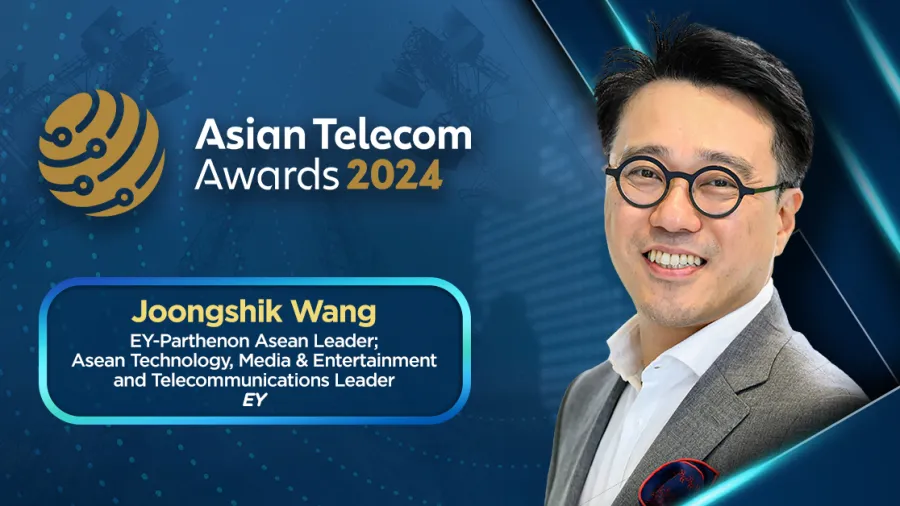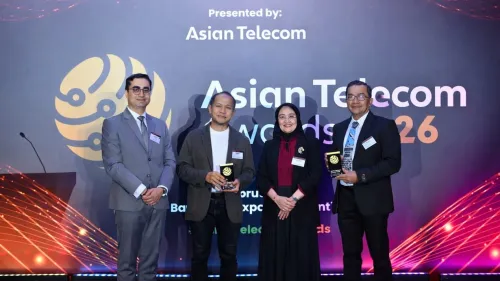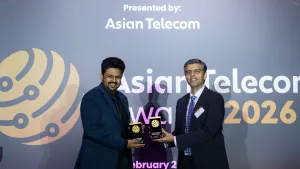
EY's Joongshik Wang emphasises 5G's transformative potential, urges telcos to shift to tailored solutions
For Joongshik, telecom players must redefine roles, offering verticalised solutions to stay ahead in 5G adoption challenges.
In the telecommunications industry today, opportunities abound with the rapid evolution of 5G technology, promising unprecedented connectivity speeds and enabling innovative services. However, the challenge lies in the substantial infrastructure investments, creating a financial hurdle for many telecom operators. Additionally, the increasing complexity of cybersecurity threats poses a significant challenge as the industry strives to safeguard sensitive user data and maintain the integrity of communication networks.
Joongshik Wang, EY-Parthenon Asean Leader and EY Asean Technology, Media & Entertainment and Telecommunications Leader, offered his valuable insights into these dynamics, as a judge in the Asia Telecom Awards 2024.
Joongshik has over 25 years of experience as a strategy and M&A transaction consultant in Southeast Asia, China, and South Korea. Holding leadership positions as the head of EY-Parthenon Asean and EY Asean Technology, Media & Entertainment and
Telecommunications Leader, Joongshik is recognised as a trusted commercial advisor to large corporations, private equity firms, and tech unicorns for his expertise in corporate strategy, commercial value creation, M&A transactions, and digital transformation.
In this article, Joongshik delves into some of the pressing issues facing the telecommunications industry. The conversation touched upon the advantages and disadvantages of industry consolidation, strategies for staying ahead in the 5G adoption curve, the opportunities presented by the digital economy, as well as Joongshik's role as a judge in the Asian Telecom Awards.
Many telecom players are currently looking into industry consolidation in attempts to boost their profitability and adapt to the ever-changing market demands. What do you think are the advantages and disadvantages this move might bring for the Asian market?
There are advantages for telcos to look at industry consolidation as a profitability strategy. For one, consolidation can lead to economies of scale and cost synergies. Organisations have better access to capital and higher bargaining power in the market. They can share higher capital and operating expenditures (capex and opex) such as on network infrastructure, IT costs and manpower.
This results in more streamlined operations. Next, telcos can increase their competitive edge. They are able to invest more in network capabilities to improve service quality and innovative solutions like IoT (internet of things) connectivity and 5G/6G technologies. This enables them to move into new areas to pursue profitable growth and expand beyond their core business to offer a wider product offering to their customers.
The telecommunications landscape and regulatory environments in Asia are incredibly diverse. Telcos are expanding through acquisitions in adjacent spaces. This may raise concerns about stifled competition and reduced innovation. Policymakers and regulators play a crucial role in mitigating these challenges. Their involvement is essential to foster an environment that not only promotes fair competition but also supports innovation in the rapidly evolving telecommunications sector.
How do you think companies will better stay on top of the 5G adoption amidst the challenges it currently brings to business?
In our recent annual EY report, Top 10 risks in telecommunications, we observed that telcos suffer from a credibility gap as digital advisors to enterprises, indicating a need for a comprehensive reevaluation of their business-to-business (B2B) enterprise strategy, business models and operations.
The emergence of 5G technology presents a strategic opportunity for telcos to redefine their roles and stay ahead. To capitalise on this, telcos must develop a strategy that goes beyond providing mere connectivity. The key lies in their ability to orchestrate and deliver verticalised end-to-end solutions, and form effective ecosystems and partnerships to cater to specific industry needs. This shift from traditional services to tailored solutions not only enhances the value proposition for organisations but also addresses the credibility gap.
With the promising developments in digital economies, what do you think are the opportunities that await telecom companies in the near future?
The advent of 5G technology has introduced complexities that are reshaping the traditional telco value chain and creating novel opportunities for telcos to anchor themselves in this evolving telecommunications value chain.
According to EY's analysis of the top 30 telcos globally, key service offerings that underline the industry's shift include cybersecurity, cloud services, and IoT. These offerings are pivotal components of the digital enterprise services portfolio and represent avenues for revenue growth. Furthermore, telcos can expand their service repertoire to encompass edge computing, network services, software-defined wide-area networking (SD-WAN), and analytics/ AI.
With the adaptation of new technologies becoming the future of telcos, access to digital talent, and investments in upskilling and reskilling will only become more important. It is crucial to put humans at the centre of transformation and growth in order to increase the probability of success.
The digital economy also presents unique opportunities for telcos to capitalise on a digital second brand. Asia has a booming digital economy thanks to an increasing population of internet and mobile phone users and efforts to improve connectivity between markets. A digital second brand serves to better engage the tech-savvy Gen Z demographic.
As part of this year's esteemed panel of judges for the Asian Telecom Awards, what specific qualities and achievements of companies do you consider in reviewing the entries?
The telco-to-techco transformation is a pivotal trend shaping the telecommunications landscape, reflecting the sector’s shift from traditional telecom services to a broader technological ecosystem. I would look out for notable achievements and qualities in navigating this transformative journey, including the successful integration of advanced technologies such as 5G, AI, and edge computing whilst at the same time addressing challenges in data governance, cybersecurity, and sustainability.














